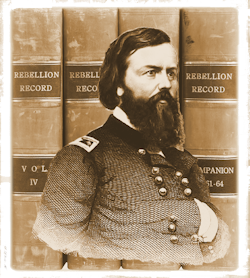March 6.—A squad of Van Allen’s cavalry today captured a rebel picket, five in number, near Bunker Hill, Va. They belonged to the Second Virginia infantry. They were carried before the Division Provost-Marshal, Lieut-Col. Andrews, of the Massachusetts Second, for examination.
-—The confederate Congress passed the following substitute for the original bill offered by Mr. Foote, of Tennessee, to authorize the destruction of cotton, tobacco, and other property in military emergencies:
Be it enacted by the Congress of the Confederate States of America, That it shall be the duty of all military commanders in the service of the confederate States to destroy all cotton, tobacco, or other property that may be useful to the enemy, if the same cannot be safely removed, whenever, in their judgment, the said cotton, tobacco, and other property is about to fall into the hands of the enemy.
The following clause was struck out of the original bill on a motion to amend:
The owners thereof shall receive just compensation therefor from the confederate government, under such laws and regulations as may hereafter be established by Congress.
It will be seen that the question of the compensation of owners of the property destroyed is cut off.—Richmond Examiner, March 7.
—President Lincoln transmitted to Congress a message, recommending the adoption of a joint resolution that “the United States ought to cooperate with any State which may adopt a gradual abolishment of slavery, giving to such State pecuniary aid, to be used by such State in its discretion to compensate for the inconveniences, public and private, produced by such change of system.” The President does not urge the adoption of the resolution, but says that the proposition is made “as an offer only,” and declares his conviction that the emancipation of slavery must be gradual, not sudden. He says the “war has been an indispensable mean” for the preservation of the Union, and the present proposition is made as something which promises “great efficiency toward ending the struggle.”— (Doc. 79.)
—Smithfield, Va., was this day occupied by a strong force of United States troops.—Capts. Bell, McKean, Du Pont, Goldsborough, and Farragut were confirmed by the Senate of the United States as flag-officers of the Navy. President Lincoln, in addition to the officers promoted for gallant conduct, nominated Brig.-Gen. Thomas to be a major-general, as a recognition of his eminent services in Kentucky.
—The Ninety-eighth regiment of New-York State volunteers arrived at New-York, en route for the scat of war. It is commanded by Col. William Dutton, a graduate of West-Point, and a classmate of Gen. McClellan.
—An adjourned meeting of citizens of Charleston, S. C, was held at the City Hall, at seven o’clock P.M., to organize the free market of the city, in order to supply the families of soldiers and sailors with provisions and necessaries, free of charge, during the existing war.— Charleston Mercury, March 6.
—A Squadron of the First regiment of Michigan cavalry surprised a party of rebel cavalry at Berryville, Va., routing them, killing three and capturing nine horses, without the loss of a man. —Baltimore American, March 7.





